True crime: How Sylvia Ferguson orchestrated husband’s murder
SHE’D snared a rich husband, then claimed she was terrified of him despite flaunting an affair. The lure of his money would help persuade her lover and another man to kill.

Crime Reads
Don't miss out on the headlines from Crime Reads. Followed categories will be added to My News.
THEY found the front door open, as she’d promised it would be.
They tiptoed through the darkened house, a grand specimen of Spanish-inspired architecture, to the bedroom she shared with her husband.
She met them in the doorway, embraced her lover and continued on her way.
Three, four minutes in the bathroom would be enough. She’d been happy enough to orchestrate the plan — but seeing it carried out was something else entirely. She had no stomach for that.
He was sleeping soundly in their bed, as she’d promised he would be. Soon, her husband would be dead.
The two men entered, a claw hammer gripped in a sweaty hand. The hand and hammer rose and swung. Metal met skull.
Sylvia Ferguson opened the bathroom door and returned to her bedroom.
The job was done. Now, to get away with it.
A MAN OF MEANS
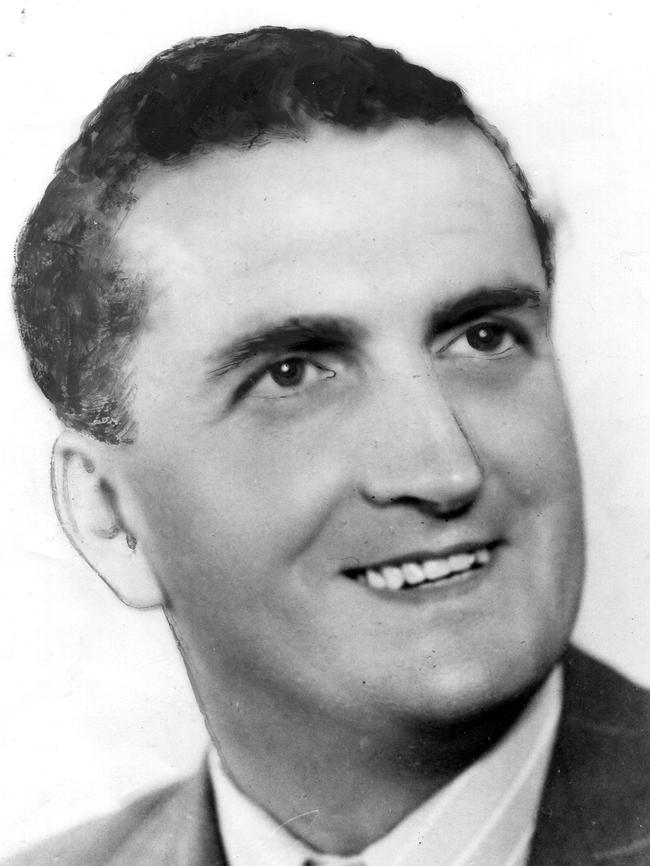
ROY Ferguson was a good catch for any woman with an eye for a particular standard of living. He and his brother John “Jack” Ferguson owned a pub near Newcastle, another in Forbes, a poultry farm in Charleston, New South Wales, and a spattering of other properties here and there.
They had shares and directorships in various companies — but a real interest in breweries. People would always drink beer. They were men of means. Canny businessmen who knew how to make a dollar.
Sylvia Joyce Clare Ferguson was a Newcastle barmaid. In the early 1940s, such a profession attracted men or very tough women. Sylvia — a stout woman who wore her dark hair in ringlets - was tough.
She’d worked in bars around Newcastle, so it was inevitable she’d cross paths with the Ferguson brothers.
Roy was a bachelor — and a wealthy one — and Sylvia spent time getting to know him. Soon they were living together. First in Swansea and then at the poultry farm in Charleston.
When Roy acquired the freehold on the Bellevue Hotel in Tuncurry, it was Sylvia’s brother who got the job managing it.
Sylvia would travel the 160km to Tuncurry during busy tourist periods and help her brother run the hotel.
A few months after Roy took over the Bellevue, a new drinks waiter started at the pub. His name was Albert Eric Murphy, but he was known as Eric. He’d met the Fergusons before.
He’d been working as a flight steward, flying from Sydney to London. He’d worked in London for a while too. He was a chauffeur and secretary to a wealthy racehorse owner.
Eric had left a wife behind when he moved to England and she divorced him on grounds of desertion.
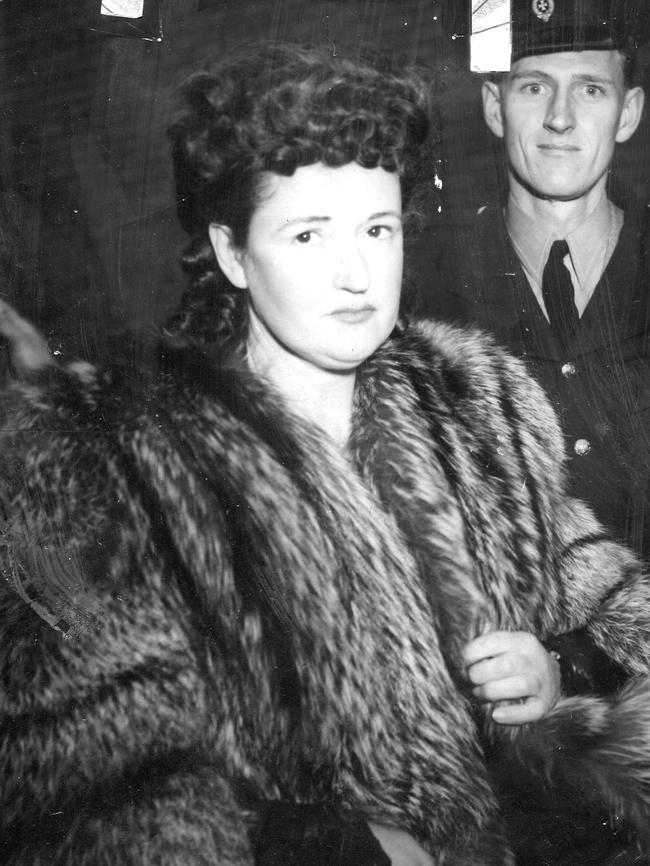
In 1951, he was back in New South Wales, working in his brother’s garage, when he met Roy Ferguson. Roy had offered him a job at one of his hotels and he’d accepted.
Eric kept his distance from Sylvia at first. Mrs Ferguson was a married woman, after all. Then, one day, he discovered Roy and Sylvia weren’t actually married.
Sylvia had let people — even her family — believe she and Roy were married. An unwed woman living with a man would have been frowned upon.
“I fell in love with her,” Eric would say later.
They began meeting in secret. Eric was given a job managing one of Roy’s brewery distribution depots. Part of his job involved delivering alcohol to people’s homes.
One of those homes was the Ferguson farm in Charleston, where Sylvia was living.
She began weaving him a tale of an unhappy home life with a “husband” who frightened her.
Roy was violent, she confided in him. Sometimes he’d get angry and hit her. On one occasion, he’d pointed a gun at her. He’d held it beside her head and fired, the noise deafening.
“See?” he’d said. “It is not a toy.”
Eric was convinced.
“Why not leave him and come away with me?” he told her.
“We would be very happy together. We love one another.”
But she’d shaken her head.
“I would be too scared to do it. He would follow me anywhere. If he caught up with me it would be the end of it. He would kill me,” she said.
A NOT-SO-SECRET AFFAIR
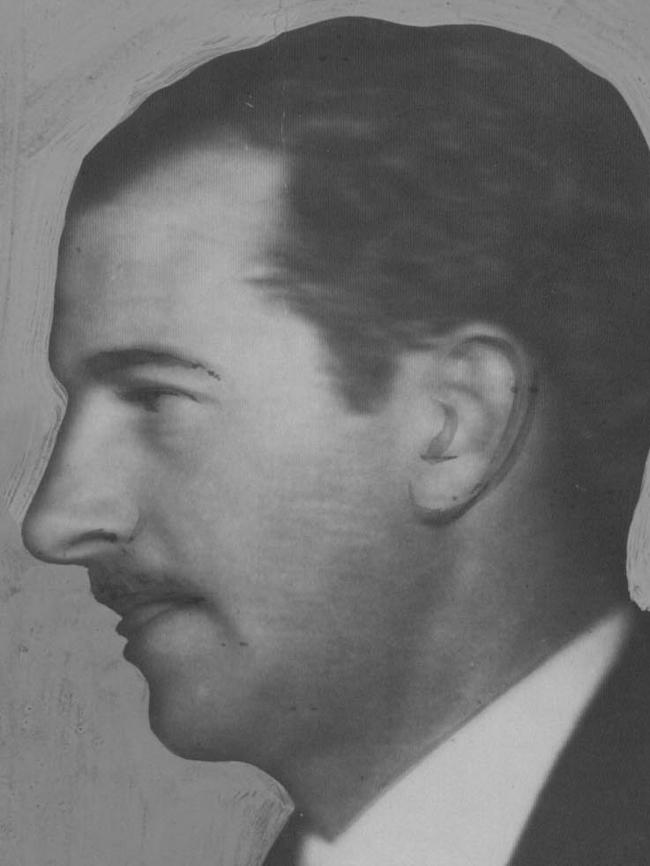
SYLVIA, however, was not too frightened of her husband to sneak about with her lover.
Workers at the poultry farm saw Eric on many occasions — usually within half an hour of Roy leaving.
They’d see him there late at night or early in the morning. On one occasion, he was seen wearing a pair of slippers that looked suspiciously like those Roy wore.
One day the workers had watched Eric arrive, only for Roy to unexpectedly return home soon after. He’d forgotten to give Sylvia a set of car keys.
She’d hidden her lover under the bed until he was on his way again.
For a woman terrified of her husband discovering her affair, she was not afraid to tell others about it.
“I was bloody near caught then,” she told a farm worker after her husband had left.
The house next door to the poultry farm was occupied by Roy’s aunt, Veronica Worell, and the affair was no secret to her.
Sylvia had told her Eric was her “boyfriend” and if anyone came to the farm while he was visiting she should tell them that nobody was at home.
She explained to Roy’s aunt that she had “no love” for him.
“She told me that if she could get enough money — 4000 or 5000 pounds — she would blow through with (Eric) Murphy and leave Roy,” Veronica would say later.
Eric only ever came to the farm the back way — past the back of other properties. Sylvia told Veronica she would hide her lover in the wardrobe if her husband came home unexpectedly.
They’d removed a panel from the back of the wardrobe so he could breathe easier while hiding behind the clothes.
They’d also taken the wire screen off one of the bedroom windows so he could make a quick escape if Roy came in through the back of the house.
If Eric was in the house, Sylvia made sure to lock all the doors. She even pulled the plugs from the electric light switches to give them more privacy — telling anyone who asked that there’d been a power blackout.
Sylvia had given Eric a wad of cash one day. Veronica had seen it. The two women had been sitting in the car when Sylvia handed over 90 pounds to Eric, asking him to place some bets at the racetrack for her and her husband.
Later, she told Veronica that Eric had kept the money for himself.
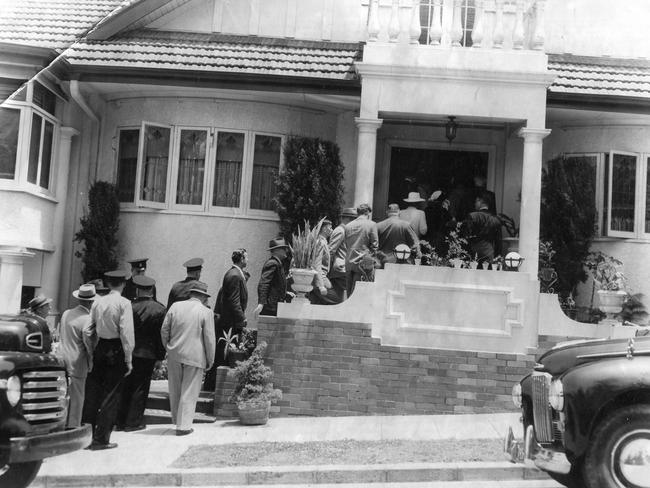
The affair continued after the Fergusons moved to Brisbane, where Roy planned to open a new brewery.
Roy bought a grand Spanish-style home on the river at Hamilton and invited another couple, Thelma Gray and her husband Wally — an employee of the Fergusons — to live with them.
If Roy was away for work, Sylvia would call her boyfriend and invite him to visit.
Sylvia continued to tell stories of a violent and abusive relationship and Eric continued to press her to leave.
And while everyone had assumed Roy and Sylvia were long married, in reality, it did not happen until midway through 1953.
Eric had been staying at a city hotel on the occasions that Sylvia had invited him to visit. She told him Roy had been “pressing” her to marry, standing over her and threatening her.
She’d begged him to come to her one day, crying into the phone.
“I met her in the park,” he would recall. “She told me how unhappy she was and that she’d been sick. She certainly looked sick. She said he had been standing over her and gave her one beating and it was then she told me that she was married.
“I asked her to come away with me. She told me he had been bullying her for months and finally, to save any further trouble and argument, she married him.
“I asked her again if she would come away with me. She repeated that as much as she wanted to, she was too scared.”
THE PLOT THICKENS
ERIC returned to Wollongong, where he’d been living with his parents, but continued to keep in contact with Sylvia.
She told him Roy had left a gun in the house, where she could see it, as a reminder of what he could do.
“I think he suspects something,” she whispered into the phone.
“I am so frightened of this gun in the house.”
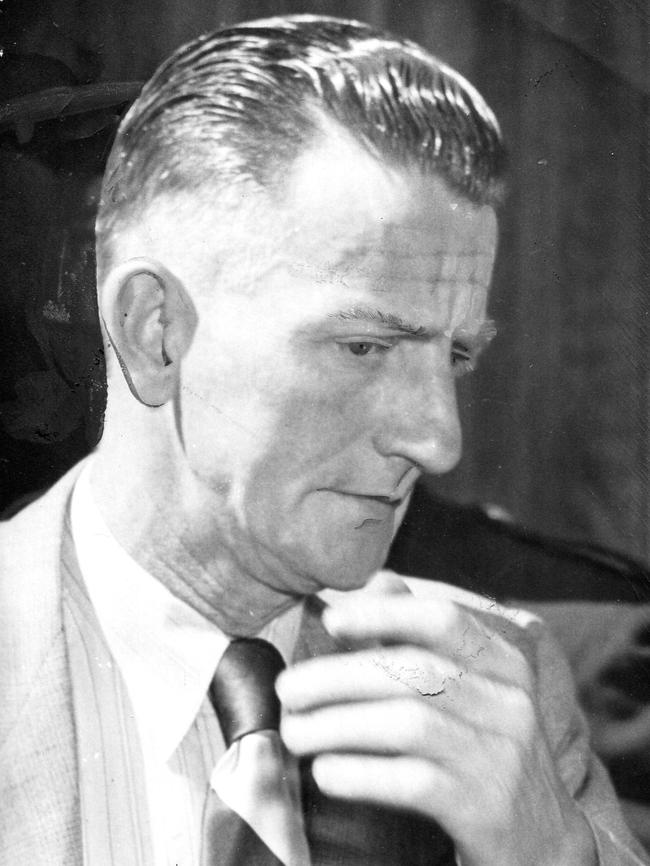
He arrived back in Brisbane in August, smuggled the gun out of the house and got rid of it.
“Why don’t you throw everything up and come away with me now?” Eric asked her. She refused.
But soon they were making plans.
Roy had a lot of money — money that could be Sylvia’s.
She suggested calling on one of Roy’s employees, Ernie Hamilton, to help carry out their plan. Ernie needed money. Perhaps he would be desperate enough to help them — for a price.
“Ernie knows all about us,” she said.
“He and his wife know. I am very friendly with his wife. I don’t think he has any love for Roy and I feel he would help us get away.”
Eric met with Ernie and told him what was on offer. Sylvia had had her husband deposit 2500 pounds in a bank account, giving her a letter that gave her access to it should anything happen to him.
He offered 1000 pounds of it to Ernie in exchange for his help.
They met soon after, Eric taking him to a boarding house where he pulled out a sawn-off rifle from a suitcase.
“Give me the gun,” Ernie said, hiding it away. He caught the tram home and waited until midnight to make his way to the Fergusons’ Hamilton home.
Ernie walked all the way from Dutton Park to the big house on the river. But when he got there he decided he hadn’t the nerve to carry it out.
He walked to Breakfast Creek, waved down a taxi and went home.
He met Eric that afternoon.
“What went wrong last night?” Eric asked him.
“I have decided not to have anything to do with it,” Ernie told him.
They met again the following day in the lounge of the Empire Hotel.
Sylvia came with Eric and her house companion Thelma Gray. Ernie brought his wife.
But when Sylvia and Ernie were alone, she placed a one pound note on the table between them.
“I have got plenty of money,” she said.
She gave him the bank letter her husband had organised, giving her access to the 2500 pounds.
“You can have that,” she told him.
Then she sweetened the deal. He could have one of the hotels. It would be his. He would be rich. A businessman.
“I must have been mad,” he would say later. But he agreed.
TIME TO ACT
THEY did it on August 20.
In the dead of night, they crept into the Ferguson home through the open front door.
Eric had told Ernie what side of the bed Roy slept on — the right. The house would be dark. They would need to feel their way around.
They crept in. Ernie could hear the sound of Roy’s steady breathing. He could make out the shape of Roy’s wristwatch. A sweaty hand gripped the hammer.
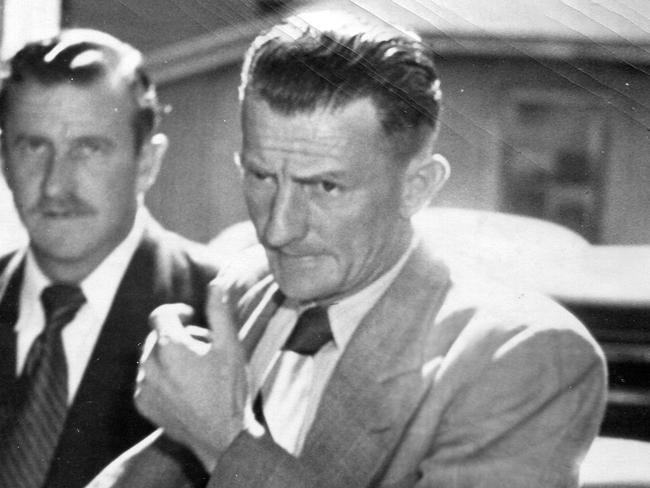
It was 1.30am when Thelma Gray woke to the sound of Sylvia’s screams.
She ran into the bedroom, shaking Thelma’s husband awake.
“Wally, Wally, help me! Roy’s dying!” she screamed.
The Grays jumped from their bed and ran through the house. Thelma went as far as the doorway, where she saw Roy in the bed, blood on his pillow.
“What’s wrong mate? What’s wrong?” Wally Gray said to Roy, shaking him gently.
“I think I’ve been hit,” Roy said to him.
They ran in circles, panicked, trying to find a number for the doctor. The phone cord had been pulled from the wall.
They replaced it, called the doctor, called the police.
Sylvia called Jack Ferguson, Roy’s brother.
“Roy’s been hit,” she said through tears. “He’s very bad.”
To the police, she said she’d risen from bed to go to the bathroom. She’d returned three or four minutes later to the sounds of her husband gurgling.
“I thought at first it was his blood pressure. He suffers with blood pressure sometimes and makes a funny noise when he is asleep,” she said.
“He also told me if he made this noise when he was asleep, to turn him over.”
She’d tried, she told them, and seen the blood.
They’d been sceptical.
Did she think someone had snuck into the house in that three or four minutes and assaulted her husband?
She’d nodded. Or maybe they’d come in earlier and spent the night hidden under the bed.
Jack arrived on a plane at 11.30am and rushed to the hospital.
“Jack, Jack, they told me to shut up,” a dying Roy told his brother.
Jack patted his hand and told him to lie back.
“They called me a ….” Roy called out.
They were the last words he would speak.
GUILTY VEDICTS
IT did not take long for Sylvia to admit to the plot. But the three would go on to blame each other. Sylvia claimed Ernie had been blackmailing her, threatening to tell her husband of the affair with Eric if she didn’t give him money.
She said she’d seen him in the house that night, planning to rob Roy.
More details of the trio’s plan emerged when detectives questioned both Eric and Ernie. Both would eventually claim the other had held the hammer.
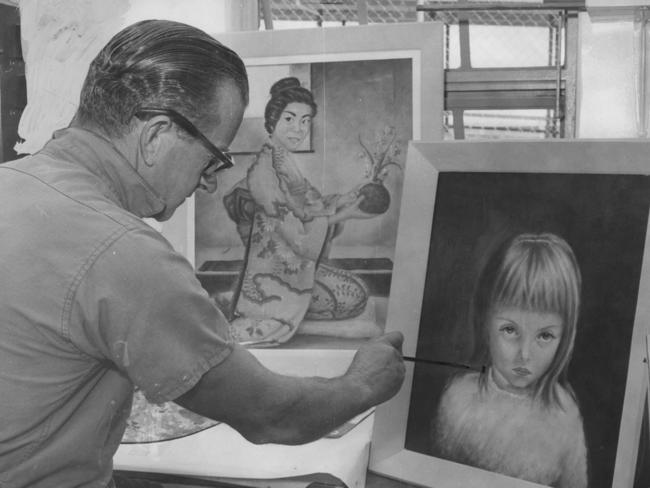
It wouldn’t save any of them — all three were convicted of murder.
Justice Townley would question everything Sylvia had to say. In a courtroom packed with women he said he doubted Roy had been a violent husband.
There’s been no evidence of that, aside from the claims of a murderess.
If she was so terrified of her husband, he said, why were so many aware of the affair? Why would she take such risks as to hide her lover in the wardrobe or under the bed?
She sobbed when they found her guilty. She’d gone from a life of riches to a prison cell.
Years later, she’d write to a friend from the prison where she spent her days looking after the gardens.
“Well, my dear, I do not expect to get my parole (for) at least 12 months,” she wrote.
“I am very upset about it as I have been in here seven years, four months … and that is too long for someone that is not guilty but I do pray the truth will come out one day and if you can help in any way I would appreciate it very much.”
Sylvia Ferguson would spend 10 years in prison for the murder of her husband.
Eric Murphy and Ernie Hamilton were released three years later.
• This is an edited version of a story first published in June 2016


